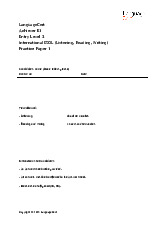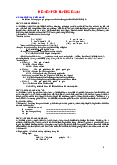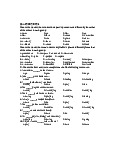











Preview text:
Unit 8 Don’t Panic!
1 Unscramble the words. Then write the letters in the circles to complete the sentence below. SCEPAE E S C A P E EABRETH B R E A T H E DWIRLFIE W I L D F I R E RDITSASE D I S A S T E R SEHAK S H A K E LLCAUYREF C A R E F U L L Y ECLLOSAP C O L L A P S E SOURVRIV S U R V I V O R GWANINR W A R N I N G QUEAKRTHAE E A R T H Q U A K E SFLMAE F L A M E S
Some disasters, like an avalanche, S T R I K E unexpectedly.
Others, like C Y C L O N E S , give us some warning. 78
2 Match each word to its definition. Write the letter on the line. ____ c _ 1. terrible a. with care ____ d _ 2. collapse b. get out ____ e _ 3. warning c. awful ____ a _ 4. carefully d. fall on itself ____ b _ 5. escape e. a sign
3 Read. Complete the sentences with words from the box. breathe collapse disasters earthquakes escape flames prevent shaking terrible (1) Earthquakes are (2) terrible events. There is nothing to do to (3) prevent
them, and they often cause other (4) disasters . For example, the (5) shaking causes buildings to (6) col apse
, which often starts electrical fires. The
smoke makes it hard for people inside to (7) breathe . Also, it’s often difficult to (8) escape from the hot (9) flames .
4 Listen. Circle T for True or F for False. 039 1. T F 4. T F 2. T F 5. T F 3. T F
5 Listen again. Correct the false statements. 040 Possible answers:
3. People like Jimmy Chin cannot predict avalanches. / Avalanches are hard to predict.
5. People do not usual y escape col apsed buildings easily.
6 Write two sentences about natural disasters. Use at least two words from the box in each sentence. Possible answers:
cyclone earthquake predict strike survivors terrible unexpected warning wildfire
1. When a cyclone strikes, the damage is terrible.
2. There are often no warnings before an earthquake. 79 GRaMMaR
Past simple vs. past continuous: Talking about the past While I was swimmin t
g he other day, I thought about the dolphins that saved four lifeguards.
What did the dolphins do when they kne a
w shark was near? They didn’t swi a m way. Instead,
they swam around the lifeguards. They were protectin t g he lifeguards from harm.
What were the lifeguards doin i
g n the water? They were enjoying a swim.
When the rescue boat arrived, the dolphins were stil keepin t g he shark away from the
lifeguards. The dolphins staye c
d lose as the lifeguards climbe i d nto the boat.
Use the past continuous to talk about an action that was already happening when another
action began or happened. Use the past simple for that second action that began or happened.
To form the past continuous, use was/were + verb + -in . g
1 Fill in the blanks. Put the verbs in the correct tense: past simple or past continuous. 1. Jimmy Chin was hiking
(hike) in the Himalayas when the weather unexpectedly became (become) terrible. 2. Jimmy was ski ng
(ski) on a high mountain when an avalanche struck (strike) without warning. 3. The flames were burning
(burn) the building when the fire engine came (come). 4. While we were living (live) in Chile, we experienced (experience) an earthquake. 5. I suddenly felt
(feel) the earth shake while I was reading (read) my book. 6. The wildfire started (start) while we were camping (camp) in the forest. 7. Did (Do) the dolphins chase (chase) the shark away when they saw (see) it? 80
2 Read. Complete the sentences with the past simple or past continuous using the words and phrases from the box. be be in trouble drive feel live happen not pay attention play scream see stop strike take talk When I (1) was little, I (2) lived in a house
on the edge of the forest. While I (3) was playing
outside with my little sister, I (4) saw
smoke and flames at the top of the trees. Of course my sister
(5) wasn’t paying attention to what (6) was happening . I knew we (7) were in trouble , but I (8) felt brave. I carefully (9) took
my sister inside. My mum (10) was talking on the phone, so I (11) screamed
, ‘There is a wildfire coming!’ My mum quickly (12) drove
us to safety. Luckily, the firefighters (13) stopped the fire before it (14) struck our house.
3 Listen. Write responses using the past simple or past continuous where needed. 041 Possible answers:
1. Jimmy Chin was brave when he was struck by an avalanche.
2. The weather became terrible while Jimmy was hiking in the Himalayas.
3. When the wildfire started, the campers were sleeping.
4. The animals were acting strangely before the tsunami hit.
5. I am not a survivor of a natural disaster. / I am a survivor of a natural disaster. I
was getting ready for bed when a tsunami struck. 81
1 Before you read, look at the title and the photos. What do you think the reading is about? Briefly write it here: Answers wil vary.
2 Listen and read. As you read, try to visualise, or see a picture in your mind of, the events the author describes. 042
Can you imagine being hit with two huge natural disasters at once? That’s exactly
what happened in northeastern Honshu, Japan’s largest island, in March 2011. A
powerful earthquake unexpectedly struck about 320 km. (200 mi.) north of Tokyo.
It was followed by a terrible tsunami. Very few scientists predicted these disasters.
Most people did not sense they were coming, so very few people prepared for them.
The earthquake was one of the strongest ever recorded. It shook the earth as
far away as parts of Russia and China. It struck in the middle of the day, while many
people were working or going to school. The earthquake collapsed buildings and
caused a lot of terrible damage. People were terrified because they knew that soon
a tsunami would hit. Many people went to higher ground or even climbed to the top
of tall buildings to escape the tsunami.
About an hour later, waves 9 m. (or 30 ft.) high began hitting the land at 800 km.
(500 mi.) per hour. Water poured over city walls and buildings, and destroyed more
buildings. The waves pushed into the land about 5 km. (3 mi.) in from the shore. There
was even one report that waves went as far ashore as 9.6 km. (6 mi.). The waves picked
up everything in their path. As the waves moved back, they carried debris, including
buildings, houses, boats and lorries back into the sea.
The Japanese government estimated that five million tonnes of debris was swept
offshore. Some remains were left floating on the surface of the sea, but most of them
sunk. The tsunami destroyed everything in its path and left many areas flooded. Its
effects were eventually seen on the shores of Hawaii, the Aleutian Islands, the west
coast of the United States, and, finally, Antarctica, where waves broke off the outer edge of the ice shelf. 82
3 Read each statement. Then tick T for True or F for False. Re-write the false statements to make them true. T F
1. Two tsunamis hit Japan at the same time.
2. People did not expect a large earthquake.
3. After the earthquake, many people ran to high places.
4. Most of the debris from the disasters is floating in the sea.
5. Effects of the disasters were seen in China and Antarctica.
Possible answers: 1. A tsunami hit Japan after an earthquake.
4. Most of the debris sunk to the bottom of the sea.
4 Read ‘Terror Comes in Twos’ again. Write down four images that you can visualise while
reading the article. Then draw simple pictures of two of them. Possible answers: Visualised images Drawings 1 . People at work or children in school and earth starts to shake and buildings col apse 2 . People running to higher ground or to the top of buildings 3 . 9-metre waves pouring over wal s and buildings 4 . Waves carrying things like houses and lorries back into the sea
5 You have read about an avalanche as wel as an earthquake followed by a tsunami. Briefly
write about how the avalanche Jimmy Chin experienced and Japan’s earthquake and tsunami
are similar and how they are different.
Similarities: natural, unexpected, sudden / Differences: in these cases the avalanche did not
destroy towns, but earthquake/tsunami did; avalanche quickly ended, but earthquake and
tsunami had continued effects and were felt far away 83 GRaMMaR
Present perfect vs. present perfect continuous: Expressing the duration of activities
Mount St. Helens has not erupte s d ince
Mount Etna has been producing smoke 1980. since early this morning.
Mount St. Helens has not erupted for years .
Mount Etna has been producing smoke for several hours. She’s climbe m d any mountains since she
She’s been climbing mountains since she was a teenager. was 15.
She and her father have been climbing mountains for seven years.
She’s always known she wanted to be a firefighter.
To form present perfect continuous: has/have + been + verb + ing. Both the present perfect and
present perfect continuous are used to talk about actions that started in the past and continue into
the present. Both are often used with since and for. The present perfect continuous focuses on a
continued activity. It is not used with verbs that describe a state of being, like be, love and know.
1 Read. Complete the text with the present perfect or present perfect continuous. be climb hope love ski travel My friend Aki (1) has loved
the outdoors since he was a child. He especially
enjoys snow sports. For example, he (2) has skied
since he was five! He’s even (3) climbed
icy mountains a few times! Right now, he’s dogsledding in Iceland.
He and his team (4) have been travel ing across the ice and snow for three days. I (5)
have been hoping to hear from him ever since he first arrived in Iceland a week ago.
But he is in the middle of nowhere. Plus he (6) has been very busy!
2 Listen to the questions. Answer them using the present perfect and present perfect continuous. 043 Sample answers:
1. I have liked winter sports since I was little.
2. She’s only been rock climbing for a couple of months.
3. I’ve been having ski ng lessons since December.
4. She’s been fighting fires for eight years.
5. I’ve known him for three years.
6. They’ve been hiking for three days now. 84
3 Read Carolina’s blog. Then respond below. Use the present perfect and present perfect continuous in your response. Hello Readers! Thanks for visiting my blog. es in our
lives. Do you have a hero? Maybe it is someone you have known for a long time.
Maybe it is someone you do not know at all. Either way, it’s important that we pay
attention to our heroes and be grateful for how they help and inspire us.
One of my heroes is someone I have known since I was a baby. It’s my Aunt
Gabriela. Aunt Gabriela has been a firefighter for as long as I can remember. She
has saved hundreds of lives. She is incredibly brave. She has faced all kinds of
disasters. Not only has she run into the flames of burning homes and buildings
to rescue people, she has also pulled survivors out of collapsed buildings after
earthquakes. Once she even jumped out of a burning building with a dog in her
arms! I would have been terrified, but not Aunt Gabriela. Aunt Gabriela, you are my hero!
Now, I want to hear from you. Please tell me about one of your heroes. What
heroic things has he or she done? Davi
My hero is my dad. He’s taught me that it’s important to take care of yourself. Since
he’s been running every morning, he has lost a lot of weight. I am so proud of him! 85 WRiTinG
When we write a narrative essay, we write a story about an experience or event. Like a story,
the narrative should include a character or characters, setting, plot, climax and conclusion. In
the final paragraph, we need to say why the story is important. For example, explain what the
main character learnt or what the point or message of the story is. 1 Organise. 1. Your topic is
. It could be about yourself, someone you know, or
a famous person. Look through the unit in your book as well as this workbook for ideas
for your narrative. If you are writing about a famous person, do some research on the
Internet. Then fill out the table below. Characters: Setting: Plot: Conflict/Climax: Conclusion: Message:
2. Plan your writing. You’ll need an introductory paragraph with a topic sentence that
introduces your topic and the person or people you are writing about. Write your topic sentence here:
3. Next, you’ll need a couple of paragraphs to explain the setting, plot, conflict and climax.
The final paragraph will include the conclusion, or what happened in the end, and the
message or point you want to share about the story. 19 Write.
1. Go to page 139 in your book. Re-read the model and writing prompt.
2. Write your first draft. Check for organisation, content, punctuation, capitalisation and spelling.
3. Check your final draft. Share it with your teacher and classmates. 86 Now I can...
Use words from the box to write two sentences about natural disasters.
You may use the photos on this page for ideas. Sample answers:
collapse cyclone earthquake escape pay attention to predict shake strike terrible wildfire
1. If people pay attention to what animals do, they might be able to prepare for a cyclone.
2. Earthquakes are terrible because they often cause other disasters like fires and cyclones.
Put the verbs in the past simple and past continuous. While we were camping (camp), a wildfire started (start) in the forest. We were (be) terrified. I
was stil screaming (still scream) after we escaped (escape) the flames. the duration of activities.
Put the verbs in the present perfect and present perfect continuous.
My uncle has chased / has been chasing (chase) storms, like tornadoes and
cyclones, ever since he survived a terrible tornado as a young man. He has photographed
(photograph) hundreds of disasters all over the world. He has been
(be) in terrible trouble many times.
Think about a survival story different from the one you wrote earlier. It could
be about an animal or a person. In a few sentences, write who the story is about,
what happened, and what the point of the story is. Sample answer:
Our neighbour never walks her dog. One day, the dog jumped the fence. She had fun
adventures al over the neighbourhood, but she was hit by a car. My dad found her and took
her to the vet. She survived, but had a broken leg. Since our neighbour does not have time, I
now walk her dog. She needs to get out, but she needs to be safe from cars.
YOU DECiDE Choose an activity. Go to page 96. 87




